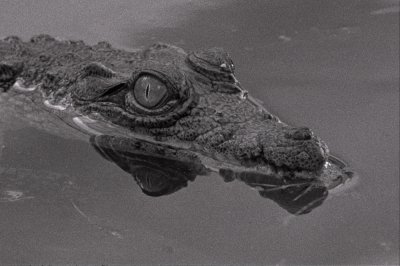Reviews - Tabu
Tabu
Reviewed By John Stakes

Tabu
Released on St Valentine's Day 2012, with a droll voice-over prologue narrative from the Director himself, Miguel Gomes' Berlin Festival award winning drama "Tabu" was screened last Sunday.
And yes it is a romantic drama. Its prologue tells of a love story of sorts, or rather its aftermath, a tale of a king who became an intrepid explorer but who committed suicide fifty years ago in darkest Africa following the loss of his beloved wife, by plunging into a river to be devoured by a crocodile. Now the presence of a fully grown crocodile at this stage, and of a cute baby version later in the film might be lost on everyone but for the Director's explanation somewhere in interview that it represented the re-incarnation of anguished love. Good.
At the heart of the film are two interwoven stories, the first set in modern day Lisbon where an elderly cantankerous and gambling addicted lady, Aurora, becomes hospitalised and persuades her neighbour and reluctant home help Pilar to try to contact a man of whom she has never spoken about. Now we see that the film's prologue has been playing out on Pilar's TV screen.
Much of this section of the film is taken up with long takes mainly indoors of three very unhappy women whilst Gomez's camera remains stubbornly inert. Why? Perhaps it was a device to demonstrate the lack of any meaningful or life enhancing relationship between them (to contrast with what is to come?). Aurora is beset with recollections of her earlier life which have become warped with time so that she believes her maid Santa is practising voodoo on her. Aurora's grown up daughter has no interest in her. The maid merely functions at her job in which she has no interest, and Pilar struggles to carve out any private life of her own whilst finding herself at Aurora's beck and call.
The second tale is an evocative flashback story after Pilar has searched for and found the man who, following Aurora's death, tells of her doomed affair with Ventura, a traveller with matinee idol looks. This sequence is set in Portuguese Mozambique sometime in the 1970s during the outbreak of the Portuguese Colonial War which began in 1961.
The entire film is shot in mono-chrome, the lengthy flashback sequence taking on a somewhat grainy feel with no dialogue save the voice over of Ventura himself who is indeed the elderly man found by Pilar and who slowly recounts a somewhat convoluted and melancholy tale of his all consuming passion and later love for Aurora.
This homage to the silent era of film-making is quite clever and captivating in its offbeat way: and, for this reviewer, at least as interesting as the 2012 Oscar winning "The Artist". Ventura is too old now to recall what may have been said but his memory remains vivid so the era is wonderfully evoked and the drama of the affair is fully realised. The visuals are accompanied by a musical score from the legendary Phil Spectre including the Ronettes' "Be My Baby" as performed by Ventura on drums as part of a musical group.
Tabu turns out to be Mount Tabu, a mountain lying close to the farmstead of Aurora's wealthy tea growing husband. At the core of the film lies the search for human happiness, paradise on earth being lost as soon as it is found. The film's structure echoes that of a 1931 silent film of the same name but does not amount to a remake.
There is no attempt to explain the significance of the Colonial War and its impact on modern day Portugal: rather more the film harks back dreamily to a bygone age of “civilised” colonial living and where the war is merely hinted at. There is no sense of contemporary guilt for past misdeeds, and we never move into the territory inhabited by say Claire Denis in her 2009 "White Material" where the French colonials are fighting for their lives in some unnamed African state engaged in civil war. We find ourselves instead straying into the territory occupied by the 1987 film "White Mischief" where, as here, a murder ensues. But as Ventura put it himself, he found the dissolute distractions of a bored and wealthy colonial society an unwelcome interference in his pursuit of Aurora as his passion blossomed into true love for her.
However politics and reality finally intervene when the local freedom fighters claim responsibility for Mario's death and colonial rule breaks down. Aurora's husband dies ten years later and both Aurora (and her daughter) and Ventura return to Lisbon but not to resume their relationship. Ventura has promised never to speak of Aurora or reveal the affair until after Aurora's death and is true to his word.
Gomes' film was ranked the second best of 2012 by the much respected "Sight and Sound" magazine (ahead of "Amour" no less). Whilst it might not earn the same level of appreciation there was much to enjoy and Gomes' control over his medium was most assured. The period detail added depth to the romantic feel. Ventura's narrative was nicely droll on occasions to lighten the prevailing sombre feel. The film divided its Keswick audience but that is surely to be expected from films which do not set out to garner universal appeal? Its inclusion in the club's seasonal programme was fully justified and would have stood its ground well in this week's eclectic mix of festival fare which is now upon us.
And yes it is a romantic drama. Its prologue tells of a love story of sorts, or rather its aftermath, a tale of a king who became an intrepid explorer but who committed suicide fifty years ago in darkest Africa following the loss of his beloved wife, by plunging into a river to be devoured by a crocodile. Now the presence of a fully grown crocodile at this stage, and of a cute baby version later in the film might be lost on everyone but for the Director's explanation somewhere in interview that it represented the re-incarnation of anguished love. Good.
At the heart of the film are two interwoven stories, the first set in modern day Lisbon where an elderly cantankerous and gambling addicted lady, Aurora, becomes hospitalised and persuades her neighbour and reluctant home help Pilar to try to contact a man of whom she has never spoken about. Now we see that the film's prologue has been playing out on Pilar's TV screen.
Much of this section of the film is taken up with long takes mainly indoors of three very unhappy women whilst Gomez's camera remains stubbornly inert. Why? Perhaps it was a device to demonstrate the lack of any meaningful or life enhancing relationship between them (to contrast with what is to come?). Aurora is beset with recollections of her earlier life which have become warped with time so that she believes her maid Santa is practising voodoo on her. Aurora's grown up daughter has no interest in her. The maid merely functions at her job in which she has no interest, and Pilar struggles to carve out any private life of her own whilst finding herself at Aurora's beck and call.
The second tale is an evocative flashback story after Pilar has searched for and found the man who, following Aurora's death, tells of her doomed affair with Ventura, a traveller with matinee idol looks. This sequence is set in Portuguese Mozambique sometime in the 1970s during the outbreak of the Portuguese Colonial War which began in 1961.
The entire film is shot in mono-chrome, the lengthy flashback sequence taking on a somewhat grainy feel with no dialogue save the voice over of Ventura himself who is indeed the elderly man found by Pilar and who slowly recounts a somewhat convoluted and melancholy tale of his all consuming passion and later love for Aurora.
This homage to the silent era of film-making is quite clever and captivating in its offbeat way: and, for this reviewer, at least as interesting as the 2012 Oscar winning "The Artist". Ventura is too old now to recall what may have been said but his memory remains vivid so the era is wonderfully evoked and the drama of the affair is fully realised. The visuals are accompanied by a musical score from the legendary Phil Spectre including the Ronettes' "Be My Baby" as performed by Ventura on drums as part of a musical group.
Tabu turns out to be Mount Tabu, a mountain lying close to the farmstead of Aurora's wealthy tea growing husband. At the core of the film lies the search for human happiness, paradise on earth being lost as soon as it is found. The film's structure echoes that of a 1931 silent film of the same name but does not amount to a remake.
There is no attempt to explain the significance of the Colonial War and its impact on modern day Portugal: rather more the film harks back dreamily to a bygone age of “civilised” colonial living and where the war is merely hinted at. There is no sense of contemporary guilt for past misdeeds, and we never move into the territory inhabited by say Claire Denis in her 2009 "White Material" where the French colonials are fighting for their lives in some unnamed African state engaged in civil war. We find ourselves instead straying into the territory occupied by the 1987 film "White Mischief" where, as here, a murder ensues. But as Ventura put it himself, he found the dissolute distractions of a bored and wealthy colonial society an unwelcome interference in his pursuit of Aurora as his passion blossomed into true love for her.
However politics and reality finally intervene when the local freedom fighters claim responsibility for Mario's death and colonial rule breaks down. Aurora's husband dies ten years later and both Aurora (and her daughter) and Ventura return to Lisbon but not to resume their relationship. Ventura has promised never to speak of Aurora or reveal the affair until after Aurora's death and is true to his word.
Gomes' film was ranked the second best of 2012 by the much respected "Sight and Sound" magazine (ahead of "Amour" no less). Whilst it might not earn the same level of appreciation there was much to enjoy and Gomes' control over his medium was most assured. The period detail added depth to the romantic feel. Ventura's narrative was nicely droll on occasions to lighten the prevailing sombre feel. The film divided its Keswick audience but that is surely to be expected from films which do not set out to garner universal appeal? Its inclusion in the club's seasonal programme was fully justified and would have stood its ground well in this week's eclectic mix of festival fare which is now upon us.
Find A Film
Search over 1500 films in the Keswick Film Club archive.
Friends
KFC is friends with Caldbeck Area Film Society and Brampton Film Club and members share benefits across all organisations
Awards
Keswick Film Club won the Best New Film Society at the British Federation Of Film Societies awards in 2000.
Since then, the club has won Film Society Of The Year and awards for Best Programme four times and Best Website twice.
We have also received numerous Distinctions and Commendations in categories including marketing, programming and website.
 Talking Pictures
The KFC Newsletter
Talking Pictures
The KFC Newsletter
Links Explore the internet with Keswick Film Club


